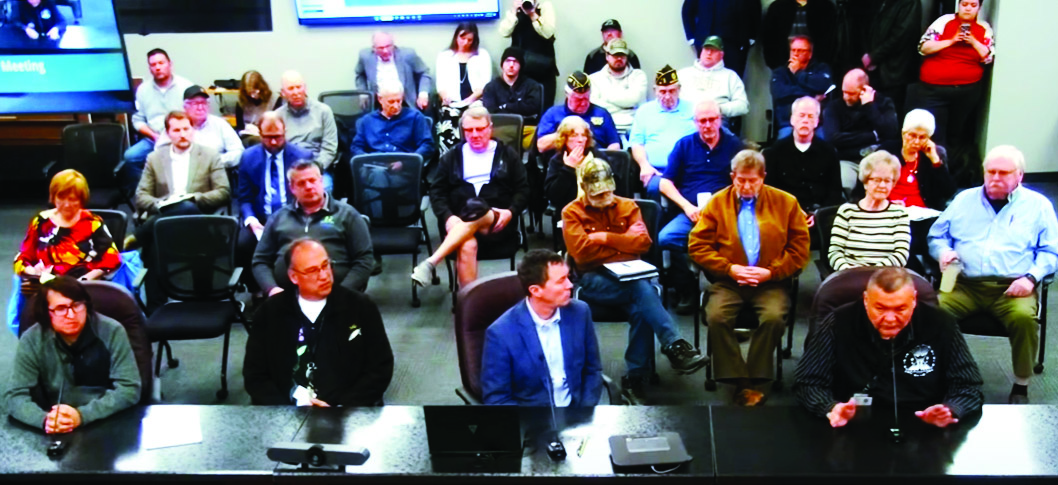
Leaders from the White Earth Nation shared preliminary plans for their casino-resort with the Clay County Commission Tuesday. (From right) Tribal chairman Michael Fairbanks; Nate Mathews; Michael LaRoque; and Richard Hanks.
Clay County Commission
Nancy Edmonds Hanson
The White Earth Nation unveiled preliminary plans for a casino and resort complex near Moorhead to the Clay County Commission Tuesday, drawing both enthusiastic and skeptical responses from the standing-room-only audience at the Clay County Courthouse.
A five-member delegation from the White Earth Band of Chippewa described the casino-resort complex the tribe plans to establish at the intersection of Interstate 94 and Highway 336 just north of the Moorhead Airport. The tribe purchased the 280-acre tract at public auction on Oct. 30, 2024, for $3.9 million, far above its assessed value of $2.3 million.
“We know we have to work to get the support from the community,” tribal chairman Michael Fairbanks told commissioners. “Our request today is to get the process started.”
The tribal nation’s first step, he said, is to seek a letter of support from the county for its application to the Bureau of Indian Affairs to establish a land trust on the site, 28 miles south of the border of the White Earth Reservation. That designation would assign ownership to the U.S. Government for the benefit of tribal members. It would also exempt the land from taxation. The White Earth Nation also plans to seek similar support from the cities of Moorhead and Dilworth, with whom the delegation plans to meet on Monday, April 28.
Project team member Nate Mathews told the group, “We have been looking for a location for a resort-casino complex for a number of years.” He added, “It could be a big economic catalyst for the community, encompassing gaming, lodging, dining and entertainment.”
As described by Mathews, early plans – he emphasized their preliminary nature – include a casino floor of 90,000 to 110,000 square feet with between 900 and 1,200 slot machines and 10 to 12 table games. The adjoining hotel, he said, will probably include 250 to 300 rooms, depending on the results of a more detailed market study. Three or four food operations are expected, ranging from fast food to fine dining.
The complex’s convention, meeting and banquet areas are currently expected to offer from 100,000 to 120,000 square feet of flexible space. The tribe also plans a truck stop and convenience center including a truck plaza, car fueling island, EV charging stations, and a 7,500 to 10,000 square foot convenience store with trucker amenities.
Mathews’ presentation estimated a minimum of 450 to 550 jobs offering a minimum wage of $19 per hour, along with health and dental benefits.
Fairbanks added, “With how fast the Moorhead-Fargo region is expanding, these numbers may be doubled by the time the studies are done. This land is one-half mile long. Multiple businesses could be put out there.
Richard Hanks noted that the White Earth Nation has not yet filed its application for land trust status. “With that letter of support, we can move towards cooperative aid agreements. Our first step was to talk with you before sending the application in.” The application goes to the Midwest office of the Bureau of Indian Affairs in Bloomington, Minnesota. If approved, it will be signed by the Secretary of the Interior.
Commissioner David Ebinger pointed out several points of concern. “We lose all zoning and land controls if this land is put in trust,” he said. It also borders on our aquifer, a prime asset that’s somewhat fragile.”
Fairbanks responded, “As water protectors back home, we are well aware of that. One of the first things we must do is get power, water and sewer out to the site” [instead of turning to wells and septic fields].
Commissioner Jenny Mongeau was enthusiastic about bringing convention space to the Minnesota side of the river. “This would draw events and visitors from all over our region,” she said. “There are really exciting opportunities here for people to move, work and have fun in Clay County.”
She noted the complexity of the proposal: “It’s important to have community input and listening sessions. We need to understand the issues and work through the challenges on the front side of the project.”
Glyndon Township supervisor John Winter noted that the board has already passed a resolution opposing the development. “Our biggest concern is the land trust aspect. When it goes into trust, we have no rights.” He cited the burden on the fire departments of Glyndon, Sabin and Moorhead. “As a supervisor, I ask for three things: An environmental study, and economic impact study, and a report on the crime impact in Mahnomen since 1991,” when the Shooting Star Casino opened.
Pointing to Clay organizations’ concern about the impact of the casino and their charitable gaming operations, he also suggested study of how the casino-resort would impact the community. “Lots of dialogue needs to take place,” he said. “There’s a lot of information we need to gather.”
Duane Erickson, a member of the Wild Rice Watershed District board who farms near Ulen, told the commission, “I oppose this because of the tax issue. Taxes are where it’s at. Do not let this land go into trust.”
Commission chair Kevin Campbell emphasized that no action would be taken on the request for a letter of support during Tuesday’s meeting. “This will take much more than one meeting at 9:10 a.m.,” he said, referring to the White Earth Nation’s initial presentation. “This has been a good start.”


